Pop is a very funny thing
june 30, 2009.
Were it not for the curious fact of what became of the small party that my daughter threw for her friends on the occasion of her 12th birthday, in the Bois de Vincennes last saturday, june 27th, I would hardly have seen reason to mention Michael Jackson's over-mediatised demise on this here site.
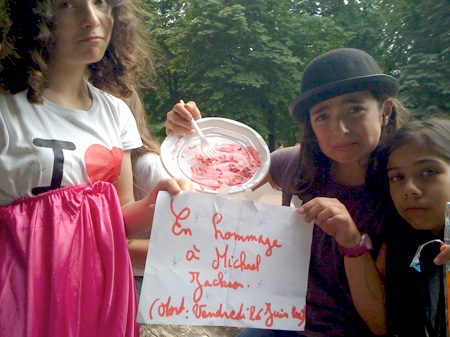
The soccer team sized bunch of kids that I accompanied (helping them carry bags with soft drinks, candy, pie and ice-cream) spontaneously turned their afternoon gathering into a full-blown Michael Jackson tribute, blasting nothing but Thriller, Bad, Billy Jean and other 1980s MJ-songs through the speakers of the iPod Dock that they had brought along, while dancing, shouting, singing, moonwalking in the streets. Pop indeed is a funny thing. Michael's Thriller may have been the music their parents danced to, but at the time they were born, the King of Pop's musical career already was way over its top.
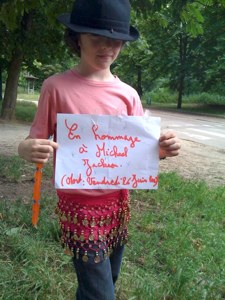 |
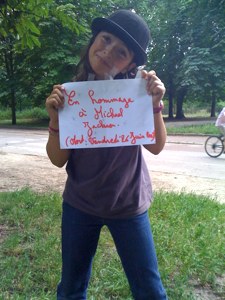 |
Some ten days earlier, on tuesday june 16th, I attended the presentation
in Amsterdam of Sound
Souvenirs, a collection of articles on audio technologies, memory
and cultural practices, edited by Karin Bijsterveld and José van Dijck as part
of their joint research project
(see the earlier
entry on a related symposium, november 2006 in Maastricht; more about
the book in a later entry).
Being partly something of a 'studio-man' at the time of Michael's rise to mega-fame
(early 1980s), I had
an obvious admiration for the Jackson sound, dense but clear and transparent
à la fois, the superb skill and craftmanship of his recordings
and - especially - for Quincy Jones'
hand in their realisation. But I did not have any particular 'sound souvenirs'
- in José van Dijck's sense -
linking my 'personal history' to Michael Jackson's pop ...
Though, come to think of it ... that is not completely true ... (what year again was it that ...)... Anyway. Be that as it may, I now do have that souvenir. For I will not lightly forget these pre-teen boys and girls dancing in line to Thriller in the Bois de Vincennes, the day (almost) that Jackson died, acting out and reflecting like mirrors a collective emotion that they picked up from their parents, friends and the media.
Pop is a very funny thing.
tags: pop, Michael Jackson
# .317.
comments for Pop is a very funny thing ::
|
Comments are disabled |
"Whatever we can describe at all ..." ( * )
june 27, 2009.
The images below show two pages from one of my many old year-by-year notebooks, stacked away here and there, in Maastricht, Amsterdam and Paris. What you see are two in a series of sort of 'mechanical drawings' that I made while watching the matches of the 1996 european soccer championship tournament. The match you see 'abstracted' (first half first, then second half) was between Turkey and Croatia, played on june 11th of that year. So that's about thirteen years ago. And what by now you may be fearing nevertheless is true: I sat during this match's 2 x 45 minutes in front of a telly, in real time tracing the ball's path with a pencil. The same I did during all the other matches in that particular tournament, I mean the ones that were live broadcast by Dutch or French national television.
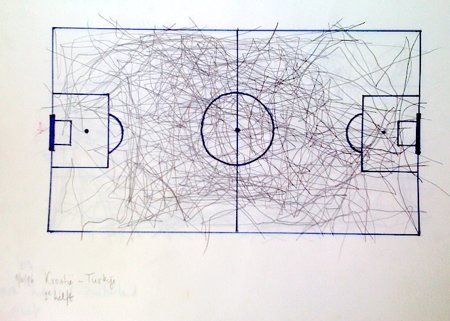 |
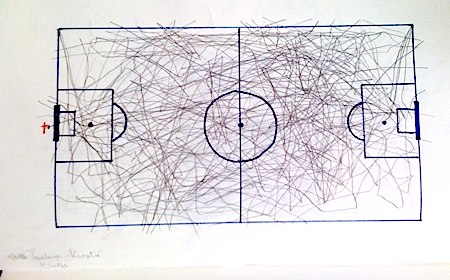 |
As the little red cross in the second drawing (to the left) indicates, Croatia scored in the second half. As there are no other red crosses, the Croatian team eventually won that match, 1 against 0. Obviously graphs like these made by hand can not be but highly approximate. If only because the camera view not always allows one to follow the ball's trajectory with certainty. They also were hard work to come up with. But I wondered what they would look like, and whether they would allow one to (literally) draw certain conclusions about a match, once documented in such a way... (exercise :-) ...)
At the time I also daydreamt of using my 'football graphs' as musical scores, by thinking of a way to interpret them in a time-based way in order to 'sound' a match. You would be able to hear in an abstract sort of way "what the final sounded like" , or how matches involving the Dutch team had a tonality rather different from matches involving the Germans ...
On another level, my capturing of these graphs was part of a lifelong and
ongoing fascination with the patterns of things and events that - randomly
laid out in (or maybe rather: giving us the illusion of) time
- make up the world as we find it. It's a fascination
that goes back to when as a young boy one day I was told that the elegantly
elusive jiggling and dancing of the many tiny particles of dust through
the air, that I often sat watching on summer days when the light of the
midday sun fell in from outside in the garden through the open kitchen window,
was caused by air molecules: even smaller particles that, unseen
by the human eye, bounced the little dust specks about. But I failed to
get a satisfying answer to my follow-up question: were there, then, even
smaller small particles that in turn pushed the molecules around?
If molecules were our world's movers, what was it that moved these molecules?
In the wake of such early fascinations I eventually got to know quite a lot of physics, and was able to glimpse the eerie, yes, the - as Eugene Wigner once put it - unreasonable effectiveness of its modeling of the measurable world, of the dazzling power and precision of the descriptions and predictions that it makes. These allow us to 'follow' matter's nervous speeding along quivering-field gradients, here and there, every now and then, settling into galaxies and planets like ours. And into dust specks, dancing on an ocean of air molecules that randomly bounce them about. Ultimately physics tracks their coming into existence (their 'being the case') down to a point at some near infinitesimal distance from an Α (that might be also an Ω) where, like in a meta pure data patch, time and space got load-banged into being ...
The remaining infinitesimal, gap then, I'd say, is of an epistemological nature. Maybe it's a limit inherent in our species. Maybe it is not. But this is where the young Wittgenstein, penning in the trenches of the first World World, catapults himself out of his Tractatus. It is what separates our knowing that from a knowing how.
...
Meanwhile all molecules do persist in their ceaseless random walks, and craft a world that, in a way, is governed by mere chance.
...
I actually wondered back in '96 whether one would be able to deduce the nature and rules of the soccer game from nothing but a series of graphs, tables and figures describing the ball's trajectory over time. That is to say: how much of the facts of the game would one be able to conjecture and then prove solely 'going by the ball' (i.e. by the 'measurable, objective manifestations of the soccer game universe')? Would it be possible to prove the existence of a certain number of agents, acting together towards a well-defined goal, and following a number of rules/laws, solely on the basis of these figures?
At the time all of this was just one among other reveries that I probably soon after the 1996 matches forgot about. I am well aware that meanwhile the scientific study, the analysis and the commercial exploitation, of myriads of registered data related to sporting events has been booming, but my little soccer graph reverie came only back to me last week, when a post on Read Write Web reported on a recent patent granted to Apple: "a network of sensors that deliver real-time velocity, impact, rotation and other data from sporting event participants to the web".
The blogpost stopped me short, and for while had me look out the window with a beatific smile ...
RWW-blogger Marshall Kirkpatrick asked his viewers to imagine their "iPhone's accelerometer placed inside a boxer's glove", but of course I imagined it inside a soccer ball, instantly drawing graphs into my browser's window, just like the ones above that I scribbled by hand 13 years ago onto the pages of my notebook.
[ I see that indeed I wrote something along these very same lines before, when in 2006 I fantasized on 'zoom-recording' a world cup soccer match, on the occasion of our live remix of the final match between Italy and France (the one with Zidane's head-bang). To say that one forgets is just another way of saying that one remembers ... ]
notes __ ::
(*) From Ludwig Wittgenstein's Tractatus
(5.634): "Alles was wir überhaupt
beschreiben können, könnte auch anders sein" ...
'Whatever we can describe at all could be other than it is'. [
^ ]
tags: random, football
# .316.
smub.it | del.icio.us | Digg it! | reddit | StumbleUpon
comments for "Whatever we can describe ..." ::
|
Comments are disabled |